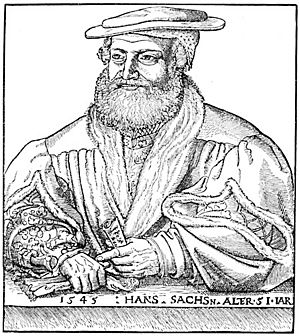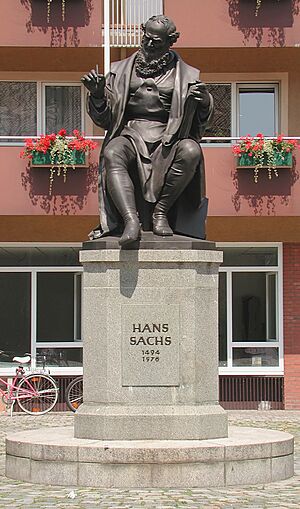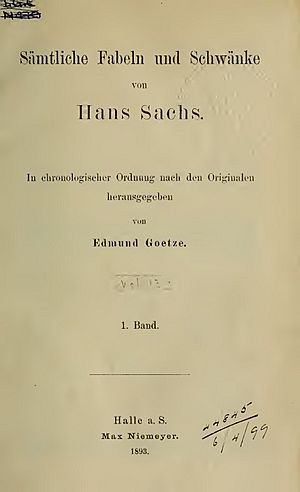Hans Sachs facts for kids
Hans Sachs (born November 5, 1494 – died January 19, 1576) was a famous German Meistersinger (which means "mastersinger"). He was also a talented poet, a playwright (someone who writes plays), and a shoemaker. He spent most of his life in the city of Nuremberg, Germany.
Contents
Hans Sachs's Early Life and Travels
Hans Sachs was born in Nuremberg (German: Nürnberg), Germany. As a child, he went to a singing school at a church in Nuremberg. This helped him discover his love for poetry and music. His father was a tailor.
Hans also attended a Latin school (German: Lateinschule) in Nuremberg. When he was 14 years old, he began an apprenticeship to become a shoemaker.
After finishing his apprenticeship, at age 17, he became a journeyman. This meant he traveled around with other young workers and students. For several years, he worked as a shoemaker in many different towns. These included Regensburg, Passau, Salzburg, Munich, Osnabrück, Lübeck, and Leipzig.
In 1513, he arrived in the small town of Wels. He stayed there for a while and focused on his artistic skills. One day, Emperor Maximilian I passed through Wels with his impressive group of followers. Young Hans Sachs was very impressed by the royal court. The emperor even let him stay in the palace at Innsbruck. Later, Hans Sachs left the court and went to Schatz and Munich.
Becoming a Mastersinger and Family Life
In the same year, Hans Sachs began training to become a mastersinger in Munich. His teacher was Lienhard Nunnenbeck, who was a linen weaver.
In 1516, Hans Sachs settled down in Nuremberg. He lived there for the rest of his life. On September 1, 1519, he married Kunigunde Creutzer (1502–1560). They had seven children, but sadly, all of them passed away during his lifetime. He married again on September 2, 1561, to a young widow named Barbara Harscher.
Hans Sachs and the Reformation
A very important event in Hans Sachs's life was the start of the Reformation. This was a big religious movement that changed Christianity. Hans Sachs became a strong supporter of Martin Luther, who led the Reformation.
In 1523, Hans Sachs wrote a famous poem about Luther. It began with the line, “The nightingale of Wittenberg, which is heard everywhere” (German: Die wittenbergisch Nachtigall, Die man jetzt höret überall). He also wrote four important prose dialogues. In these, he showed his strong support for Luther. However, he also advised people to be moderate and calm.
Because he supported the new faith, the town council of Nuremberg warned him. They told him not to publish any more “pamphlets or rhymes” (German: Büchlein oder Reimen). But it wasn't long before the council itself openly supported the Reformation.
Hans Sachs's Many Works
Hans Sachs wrote an incredible number of works, over 6000 pieces in total! The exact number can vary because sometimes it's hard to tell if a piece is a separate work or part of a bigger one. Also, different people might put his works into different categories.
What makes his work even more amazing is that he kept working as a shoemaker his whole life. Mastersingers usually did not write or sing for money.
His many works include:
- Mastersongs (German: Meisterlieder): He wrote about 4200 of these.
- Other poems and songs.
- Carnival plays: These were short, funny plays performed during carnival time.
- Tragedies: Serious plays.
- Comedies: Funny plays.
- Prose dialogues: Conversations written down.
- Fables: Short stories with a moral lesson.
- Religious writings: For example, he worked with Andreas Osiander on “A wonderful prophecy of the papacy about how things will go for it up until the end of the world” (German: Eyn wunderliche Weyssagung von dem Babsttumb, wie es ihm biz an das endt der welt gehen sol) in 1527.
Understanding His Plays
Hans Sachs's mastersongs were not published for everyone to read. They were mainly for the Nuremberg Meistersinger school, where Sachs was a very important leader. His fame mostly comes from his "spoken poems" (German: Spruchgedichte), which include his plays.
His "tragedies" and "comedies" are often like stories told through dialogue. They are divided into different parts by pauses. Hans Sachs wasn't always focused on how a play should be built or how dramatic action works.
He got his ideas for plays from many different places. These included the Bible, classic stories, and tales from Italian writers. He was best at writing short, funny plays called Fastnachtsspiel or Shrovetide plays. In these plays, funny characters and situations were more important than the play's structure.
Some of his funny plays are still performed on stage today. These include:
- Der fahrende Schüler im Paradies (The Traveling Student in Paradise) from 1550.
- Das Wildbad (The Spa) from 1550.
- Das heiss Eisen (The Hot Iron) from 1551.
- Der Bauer im Fegefeuer (The Peasant in Purgatory) from 1552.
Hans Sachs in Fiction
Hans Sachs is a character in an opera (a play set to music) from 1840 by Albert Lortzing. He is also a main character in Richard Wagner's famous opera Die Meistersinger von Nürnberg (The Mastersingers of Nuremberg), which was first performed in 1868.
See also
 In Spanish: Hans Sachs para niños
In Spanish: Hans Sachs para niños
 | Toni Morrison |
 | Barack Obama |
 | Martin Luther King Jr. |
 | Ralph Bunche |




